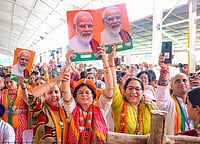The Election Commission's decision to not hold parliamentary and state Assembly elections in Jammu and Kashmir simultaneously shouldn't be a surprise. Rather, it was on expected lines going by the recent developments in the state.
Chief Election Commissioner Sunil Arora on Sunday said that one of the major concerns was the constraint of central forces, and also that it can't disregard the recent developments. He was probably pointing to the post-Pulwama, post-Balakot situation.
Governor's rule was imposed in Jammu and Kashmir on June 19 last year after BJP pulled out of the ruling alliance with PDP, and since January 19 the state has been under President's Rule.
Former Chief Ministers Omar Abdullah and Mehbooba Mufti have been highly critical of the deferment of state assembly polls. But, it is also a fact that since 1967 there has never been simultaneous assembly and parliamentary elections in Jammu and Kashmir. In 1977, 1996 and 2014, the two polls were held in the same year but after a gap of few months.
The Election Commission, though an independent body, does take into consideration the recommendations of the State governments and the home ministry before arriving at a decision, more so for Jammu and Kashmir.
Since the imposition of Governor's Rule, now President's Rule, the BJP-led NDA central government is trying to run its writ in the state, in its assumption of changing the narrative of Kashmir. It has come down heavily on separatism, security forces have been given a free hand to take on terrorists, and a sense of urgency and transparency has been brought in the administration.
Barring the February 14 deadly Pulwama terrorist attack, which left 40 security personnel dead, the government it appears believes it is on the job. Last year, about 250 terrorists were killed, the highest in a single year in the last decade.
The security forces in particular are going all out against the terrorist outfit Jaish-e-Mohammed, which carried out the Pulwama attack. Last year, 58 Jaish terrorists were killed, and this year till March about 15 have been killed.
Separatism and radicalism are entwined, posing a challenge and concern for successive central governments by making binary of Us (Kashmir) and Them (India).
It was after about 30 years that the government banned the Jamat-e-Islami J&K, which is different from Jamat-e-Islami Hind, as it regards J&K a disputed territory. In 1990, terrorism had started in full steam and defiance of the state's writ was open and brazen. Jamat was not only supportive but active. Then Governor Jagmohan banned it.
Terrorism had been contained to a large extent but separatism and radicalism have not. Union Home Minister Rajnath Singh had repeatedly said these two are the major concerns, and he had also famously said they have a “solution” for Kashmir.
By banning Jamat, the central government sent a signal that separatism in any form is just unacceptable, and since the Jamat cadre had tacitly supported PDP in the past the latter was given a message that vote bank supportive of separatist ideology would be cut down to size.
Since President's Rule was imposed, many projects especially concerning Jammu region, which were held up in the PDP-BJP government, are being undertaken at high speed. Last year, J&K Chief Secretary BVR Subrahmanyam had said for developmental work Jammu will get at least “one rupee more and not less than the Kashmir”.
It's for the first time the BJP is directly ruling the state, and thus nurturing a pro-BJP constituency in official machinery, and needs time for consolidation of its moves to show tangible results.
Any democratically elected government will always be headed by a Kashmiri leadership, going by the numbers, and it's quite likely that many such decisions would be reversed, which the BJP doesn't want, at least for now.
Post the Balakot airstrike, Pakistan has been firing along the Line-of-Control and International Border too, taking lives of four people in Poonch district in Jammu region. Army chief Bipin Rawat had asked troops to remain prepared for any eventuality. Holding elections if firing scales up will not only be a challenge but the poll percentage may take a hit, which no government wants in Jammu region.
Shortly after the Election Commission press conference, former CM Omar Abdullah tweeted that PM Modi has “surrendered” to Pakistan, militants and the Hurriyat.
By taking on all three mentioned by Omar, the BJP is reading and writing the script the other way.






















.png?w=200&auto=format%2Ccompress&fit=max)



